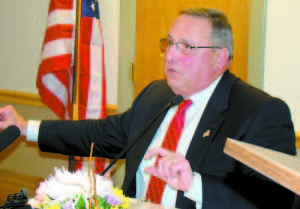What the Gov. also said…

GOV. PAUL LEPAGE uses his hands to illustrate an idea he was expressing during a town hall meeting in Bridgton on Jan. 6. (De Busk Photo)
By Dawn De Busk
Staff Writer
Maine Governor Paul LePage said he spends time pouring over lists of the best and the worst states to live in America.
He reads the statistics and the studies the research, both of which point to what factors make some states a more desirable place to call home than others.
No, LePage is not planning to rent a U-Haul, pack his belongings, and move to another more prosperous state.
Instead, LePage proposes to make some changes that he said should improve Maine’s standings.
On Jan. 6, LePage arrived in Bridgton for a town hall meeting, which brought a crowd of more than 100 people. Many of those individuals had donated to LePage’s campaign or were registered with the Maine Republican Party, and were notified via an e-mail two days before the planned event that took place on a Wednesday.
During the town hall meeting, LePage talked about the topics he hopes to tackle. Then, audience members asked questions, which were written down and viewed by staffers prior to the governor stepping into the room.
LePage addressed Maine’s status as one of the poorest, most taxed states in the Union, with a big welfare benefits budget.
“I only have three years to get it done,†he said, referring to the remainder of his second gubernatorial term.
The four topics he discussed were taxes, welfare, Maine’s wealth rating and energy costs. During the question and answer period, nationwide issues like gun control and providing political asylum to refugees were touched upon.
As has been presented in the past, LePage talked about eliminating the state income tax and counter-balancing that with an increased sales, or consumption, tax. He said he would like those tax reforms to be in place by 2021.
He cited no income tax as one of the factors that placed neighboring New Hampshire in the top ten wealthiest states.
He stated his opposition to raising the minimum wage — saying that would only hurt Maine’s economy.
“Increasing minimum wage is not smart in a poor state,†he said.
Another factor in Maine’s low ranking in wealth is that “we are the oldest state in America.â€
He said the median age for Mainers is 44 years old, compared to Utah which has a median age of 29 years old. He said that while a portion of the state is retired and on a fixed income, those people raised in Maine leave the state to find higher paying jobs and/or a lower cost of living.
“Seventy percent of kids raised in Maine, go away, get educated, and never come back. It would be easier to stay if their loan is paid,†he said.
He offered up a proposal to make Maine more attractive to younger people in their wage-earning years. With the help of the Harold Alfond Foundation, people with student loan debts who live in Maine for five years would receive loan forgiveness or have the existing loans reconsolidated at a lower interest rate, he said.
This loan assistance would apply to educational facilities where students earn a degree and to schools that offer certifications in the trades like plumbing, carpentry or auto mechanics.
Assistance with paying of education loans is one factor that would appeal to “young people just starting families,†LePage said.
“Not higher wages — help with student loans so (young Mainers) could buy a new car,†he said.
In a generalized way, he said he’d like $500,000 added to the education budget, with an emphasis on Sciences, Technology, Engineering and Mathematics (STEM).
Although the governor did not have a precise plan laid out, he said he would like to make Maine more business friendly. He said that the Southeastern states have bested Maine when it comes to snagging big business contracts which equal more jobs.
On the flip side, LePage said since his administration has been in place, the unemployment rate has dropped from 8% to 4.1%.
There are currently 15,000 jobs in the job bank, he said.
The State of Maine has reduced the number of people on welfare, too, he said. The number of people receiving food stamps, also known as the Supplemental Nutritional Assistance Program (SNAP), was reduced by 50,000, he said.
In 2011, when LePage took office, Maine had the not-so-coveted Number One spot as a “welfare state.†Now, it is number three, he said.
LePage said the biggest demographic on welfare are able-bodied men between 19 and 49. He said they should “get educated and get a job.â€
An audience member asked about providing political asylum for refugees.
LePage said that people who are not yet American citizens come to Maine because they hear that the welfare benefits are good; and 70% of the time, they return to their country of origin within 18 months.
“Maine picks up the tab,†he said.
Another concern was the spread of new strains of infectious diseases — information he would not be privy to because of HIPPA laws, LePage said.
“I will help anyone in the world. I will help my family first, and my neighbor second,†LePage said.
The last question of the evening was asked by Devon Hatch, who barely looked old enough to vote.
“As a citizen, how do I propel the State of Maine to a prosperous state,†Hatch asked.
The governor responded.
“Get involved. Whether you agree with me or not is irrelevant. Get involved,†he said.
To view a video recording of the governor’s town hall meeting in Bridgton, go to Lake Region Television’s webite.

